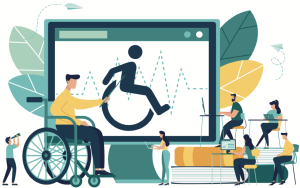Educate the Employer
Advocate, Communicate, Educate: ACE It!
The ACE It! series is designed to help you “ACE” any conversations you may have with potential employers by knowing how best to Advocate for your students, inform the employer how to effectively Communicate with employees with disabilities, and Educate the employer about workplace accommodations.
For the rest of the series, see Advocate and Communicate.
E: Educate
When the potential employer is considering hiring your student, they may have a number of questions or concerns regarding the student’s workplace needs. As the faculty member providing the student’s referral, you have the opportunity to dispel those concerns and inform the employer that hiring an individual with disabilities is no more difficult or costly than an individual without disabilities.
Workplace Accommodations
A common misconception is that accommodations are very difficult and costly to make, but this is not the case. Try framing accommodations with the following facts:
- Low or No Cost: Refer the employer to research from the Job Accommodation Network (JAN), which shows 59% of accommodations cost nothing, 36% require a one-time cost, and only 5% had an ongoing cost. Costs are typically less than $500.
- Accommodation as a Productivity Tool: Propose to the employer that they view accommodation through the lens of productivity tools. All employees need tools to be productive and successful, and individuals with disabilities may simply need different tools.
Workplace Safety
Workplace safety is another concern related to hiring students with disabilities. However, there is no correlation between having a disability and the individual’s safety in the workplace.
- Safety for All: Many of the things your industry partner is already doing for employee safety will benefit employees with disabilities as well.
- Buddy System: For emergency situations, employers often implement a "buddy system"; this involves all employees working in teams so they can locate and assist each other in emergencies.
Benefits
Make sure your industry partner knows that companies that champion disability inclusion outperform their peer organizations. According to the report Getting to Equal: The Disability Inclusion Advantage, produced by Disability:IN and the American Association of People with Disabilities, these companies:
- Experience an average of 28% higher revenue.
- Are twice as likely to have higher shareholder returns.
- See increased innovation, improved productivity, and enhanced reputation.
Confidentiality
Know your college policies and student rights under the Family Educational Rights and Privacy Act as it relates to sharing student information. For you and the employer, maintaining confidentiality not only fulfills legal obligations, it also creates an environment where students feel respected and supported. Remind the employer that if a student discloses the nature of their disability to them, even if it is obvious, they should not disclose it to others.
Resources
- Job Accommodation Network (JAN)
- Getting to Equal: The Disability Inclusion Advantage (PDF download)
- Family Educational Rights and Privacy Act (FERPA)
- Disability Equality Index
- ADA & Workplace Safety
- OSHA Standard Interpretations for Employees with Disabilities
Printable (PDF) Version of Tip Sheet
Developed in conjunction with Technological Education Center for Deaf and Hard-of-Hearing Students (DeafTEC), based at the Rochester Institute of Technology. ![]()